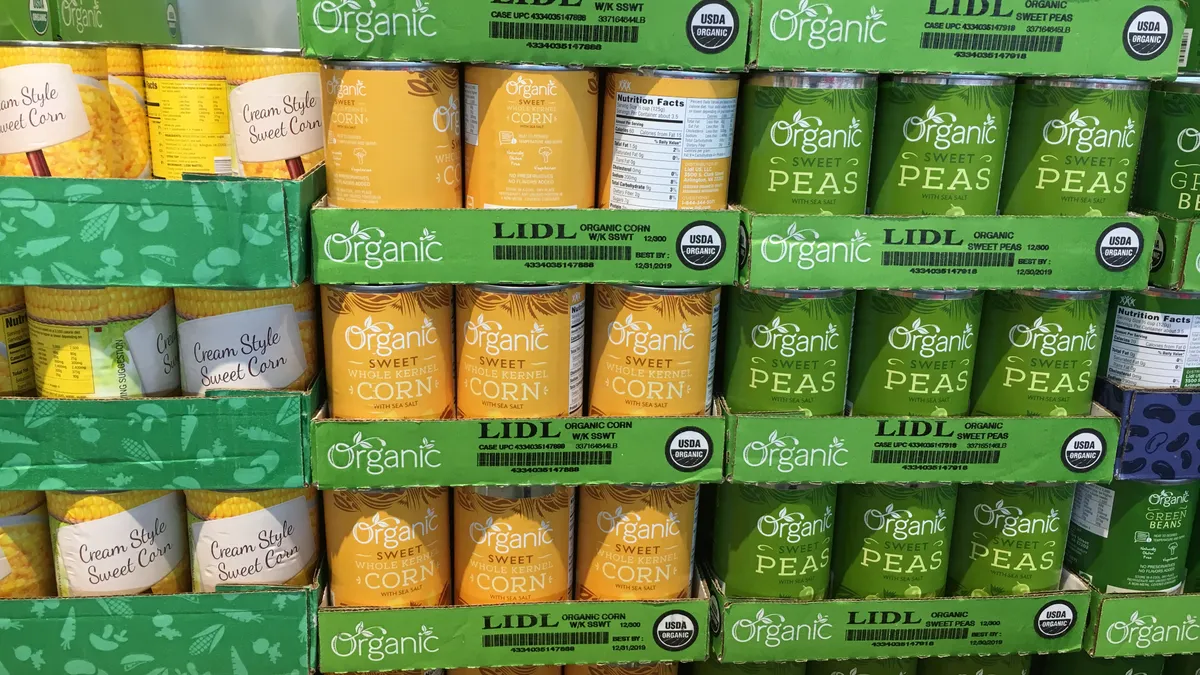Dive Brief:
- Private label sales continue to outpace national brand sales, with dollar sales growing 5.8% compared to 1.5% over the past year, according to research firm IRI, while unit sales have growth 3.8% compared to .2%.
- At the same time, IRI notes that grocery retailers are lagging behind club and mass retailers in store brand growth, with dollar sales up 1.2% while unit sales are down 1.7% over the past year. Club and mass retailers, meanwhile, grew store brand basket sizes by 3.3% and 2.9%, respectively, during that period.
- IRI notes that demand for store brands remains high even in the strong economy, with 8 out of 10 consumers saying they buy these products at least occasionally. Sixty-eight percent of those polled by the firm said private label offers a better value than national brands while 82% of millennials say the selection of food and beverage store brands factors into their choice of where they shop.
Dive Insight:
Private label development has come such a long way at supermarkets across the country that it's easy to overlook the fact that they should be doing better.
What explains the underperformance? It's hard to know exactly, since uncovering missed opportunities inside what's overwhelmingly been a success story for retailers is difficult. But additional research from IRI points to one answer: Store brand assortments don’t line up with consumer spending and preferences.
According to the firm's and the Food Marketing Institute's "Power of Private Brands" report released this summer, dollar share of grocery private label in the premium (24%), value (18%) and organic (6%) segments has remained unchanged since 2015 despite shifting industry economics. In that time, organic sales have grown by more than 15%, according to data from the Organic Trade Association. Meanwhile around a third of consumers say they struggle to afford groceries, IRI notes, reflecting a greater need for value brands than currently exists.
More and more retailers have introduced three-tier store brand assortments that include value, everyday and premium lines. This reflects a drive to move beyond mainstream brands alone, but as income disparity increases in the U.S., IRI noted, grocery stores will need to put more emphasis on the value and premium ends of those offerings.
In addition to aligning with consumer economics, retailers also need to align their store brand offerings with promising categories. Ice cream and frozen pizza have been top sellers in the private label space, according to Packaged Facts. There are other categories that could yield surprises, like candy. To get an accurate read on where to invest, grocers should continue to follow category reports, store sales and also survey their customers.
Alternative formats have been cutting into grocery sales for years, and so it goes with private labels. Costco's Kirkland brand has a very loyal following while BJ's has invested heavily in its store brands, offering standalone websites for some. Aldi's very strong price-meets-quality store brand proposition just got an update this summer with the chain announcing it would refresh 20% of its assortment with new products.
There are a lot of forces weighing on grocers and their private label offerings. But there are also a lot of ways to win. As long as retailers remain open to continual evolution of their store brands, there's always room to grow. Stores have come a long way, but they're nowhere near finished yet.













